It looks like you're using an Ad Blocker.
Please white-list or disable AboveTopSecret.com in your ad-blocking tool.
Thank you.
Some features of ATS will be disabled while you continue to use an ad-blocker.
share:
[1/2]

In Abrahamic traditions, the patriarch of the Israelites is a man named Jacob. During a peculiar event, Jacob is said to have wrestled with a man throughout the entirety of the night. The man, with whom Jacob wrestled, is believed to have been an instrument of God, an angel of God, a manifestation of God, or God Himself.
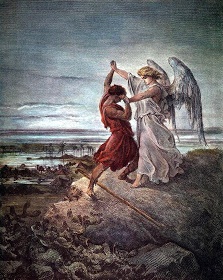
After this mysterious event, Jacob's name was changed to Israel (Yisra'el), which the Bible tells us signifies Jacob wrestling with God and man.
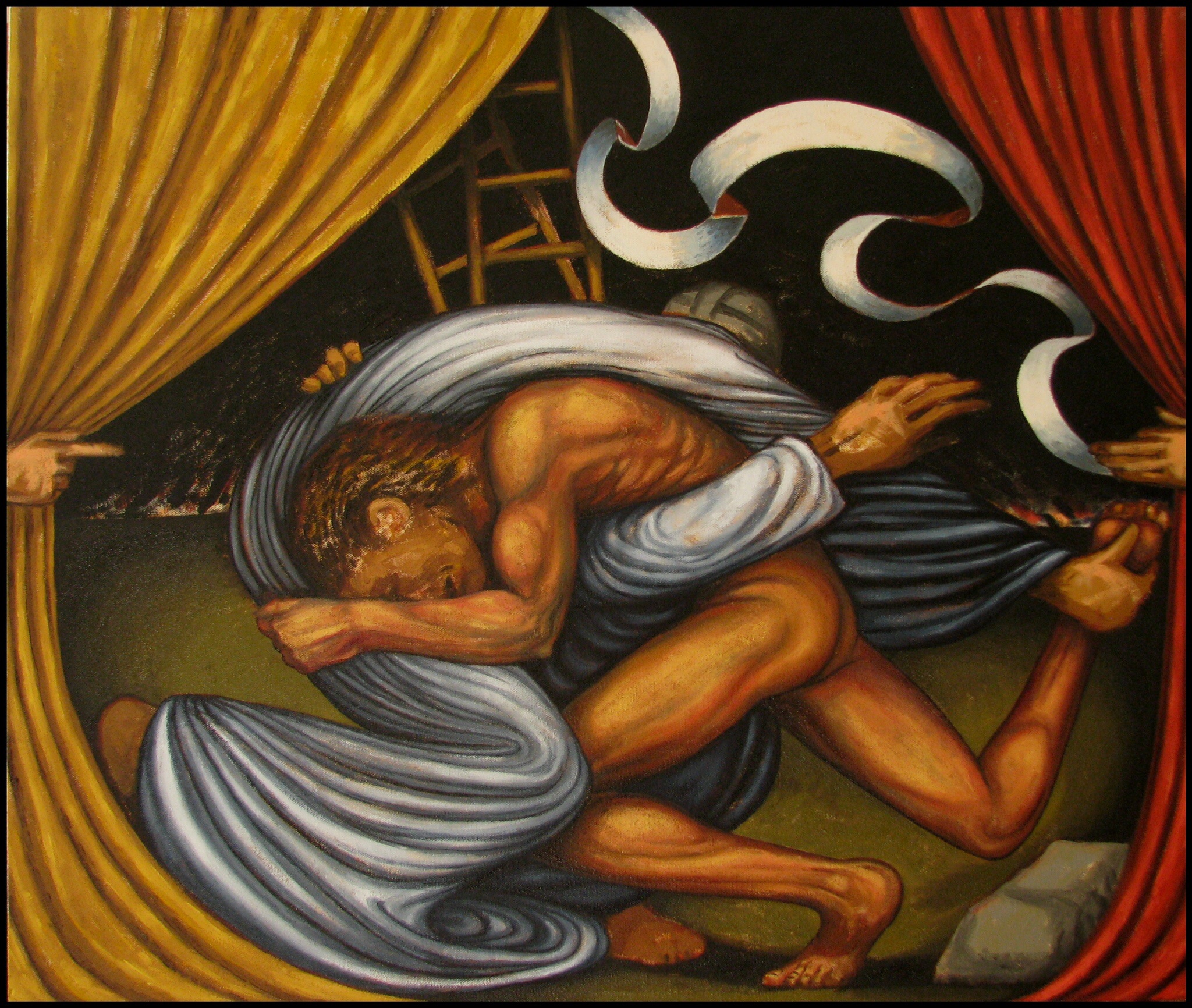
The word "Israel" has traditionally been understood as an accompanying relationship, such as "Struggle with God", "Strive with God", "Fight with God", and "Triumph with God", amongst other similar meanings, in addition to alternative etymologies such as "God Rules", "Rules with God", "God Perseveres", "Persevere with God", etc.
I, however, challenge this traditionally held understanding of companionship. From the above Biblical quote, I would like to highlight verse 28, and in particular, the word "with":
(28) “Your name will no longer be Jacob, but Israel, because you have struggled with God and with humans and have overcome.”
The Hebrew word used in this particular instance is עִם־ ('im).
Strong's Hebrew Concordance (word #5973) defines עִם־ as "against".
The New American Standard Bible (NASB) Concordance gives several definitions for עִם־, however, in the overwhelming majority of instances, עִם־ is translated as "against".
The Brown–Driver–Briggs (BDB) Hebrew and English Lexicon of the Old Testament gives the following explanation of עִם־:
Therefore, we discover that translating עִם as "with" is an inaccurate sugar-coating that should, instead, be translated as "against". The verse reads more accurate as:
(28) “Your name will no longer be Jacob, but Israel, because you have struggled against God and against humans and have overcome.”
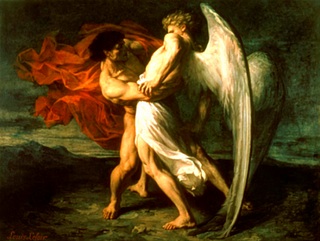

In Abrahamic traditions, the patriarch of the Israelites is a man named Jacob. During a peculiar event, Jacob is said to have wrestled with a man throughout the entirety of the night. The man, with whom Jacob wrestled, is believed to have been an instrument of God, an angel of God, a manifestation of God, or God Himself.

After this mysterious event, Jacob's name was changed to Israel (Yisra'el), which the Bible tells us signifies Jacob wrestling with God and man.

Jacob was left alone, and a man wrestled with him till daybreak. When the man saw that he could not overpower him, he touched the socket of Jacob’s hip so that his hip was wrenched as he wrestled with the man. Then the man said, “Let me go, for it is daybreak.”
But Jacob replied, “I will not let you go unless you bless me.”
The man asked him, “What is your name?”
“Jacob,” he answered.
Then the man said, “Your name will no longer be Jacob, but Israel, because you have struggled with God and with humans and have overcome.”
Jacob said, “Please tell me your name.”
But he replied, “Why do you ask my name?” Then he blessed him there.
So Jacob called the place Peniel, saying, “It is because I saw God face to face, and yet my life was spared.”
Genesis 32:24-30
The word "Israel" has traditionally been understood as an accompanying relationship, such as "Struggle with God", "Strive with God", "Fight with God", and "Triumph with God", amongst other similar meanings, in addition to alternative etymologies such as "God Rules", "Rules with God", "God Perseveres", "Persevere with God", etc.
I, however, challenge this traditionally held understanding of companionship. From the above Biblical quote, I would like to highlight verse 28, and in particular, the word "with":
(28) “Your name will no longer be Jacob, but Israel, because you have struggled with God and with humans and have overcome.”
The Hebrew word used in this particular instance is עִם־ ('im).
Strong's Hebrew Concordance (word #5973) defines עִם־ as "against".
The New American Standard Bible (NASB) Concordance gives several definitions for עִם־, however, in the overwhelming majority of instances, עִם־ is translated as "against".
The Brown–Driver–Briggs (BDB) Hebrew and English Lexicon of the Old Testament gives the following explanation of עִם־:
c. If the common action be of the nature of a contest or combat, עִם is 'with' in the sense of 'against': so often with נִלְחַם 'to fight', נִשְׁמַּט 'to dispute', נֶאֱבַק 'to wrestle', רִיב 'to strive'
Therefore, we discover that translating עִם as "with" is an inaccurate sugar-coating that should, instead, be translated as "against". The verse reads more accurate as:
(28) “Your name will no longer be Jacob, but Israel, because you have struggled against God and against humans and have overcome.”

[2/2]
Now,... to understand why Jacob, the Hebrew-Israelites, or the Jews would fight against God, it gets a bit more complicated. Please bear with me
As many of us know, the proper name for the national God of Israel is Yahweh (YHWH). Each time we read "LORD" fully capitalized in the English translation of the Old Testament, it represents the name "YHWH".
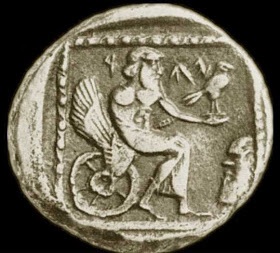
(Yahu)
As many of us have controversially concluded; YHWH is not the only God of the Old Testament. In accord with the local Canaanite religions, the God El is known as the Father of the Gods, with YHWH being one of His Sons.
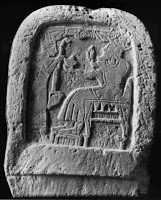
(El)
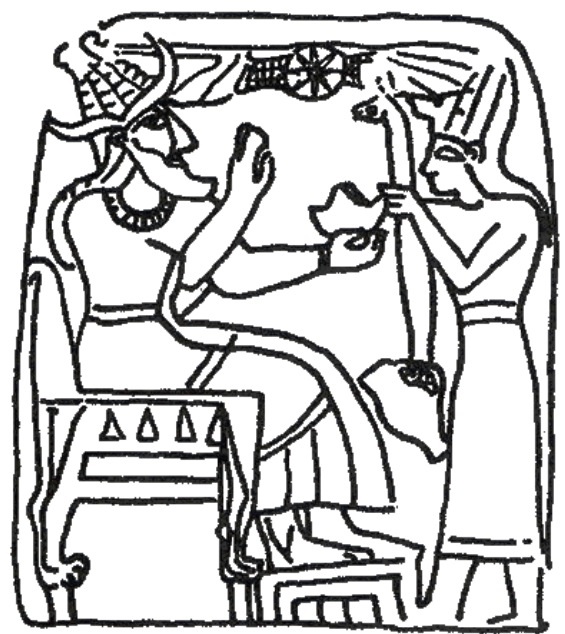
The following Biblical passages, amongst others, clearly depict El as the Father God, with Yahweh as His Son.
Once again referring to Genesis 32:28, let us examine with whom Jacob fought:
“Your name will no longer be Jacob, but Israel, because you have struggled against Elohim and against humans and have overcome.”
When the word "Elohim" is used in a singular context, it is referring to El. When the word "Elohim" is used in a plural context, it is referring to either the Divine Council or to the Sons of El.
In the instance of Jacob's fight, Elohim is used in a singular context; referring to El. Additionally, the end portion of the event gives us even further context into the identity of Jacob's adversary:
In addition to a geographic location, the word "Peniel" is actually a Hebrew compound word stemming from "Panim/Paneh/Panah El", which means; "Face of El".
Although El is the Father of the Gods, we are repeatedly told, in the Old Testament, that Yahweh (YHWH) is the God of Israel. It is my conclusion that the religion presented in the Old Testament theologically illustrates either a falling away from Elohism/Elism in favor of Yahwism/Jahism,... or the conquering, stamping-out, and assimilating the religion of El by the religion of Yahweh.
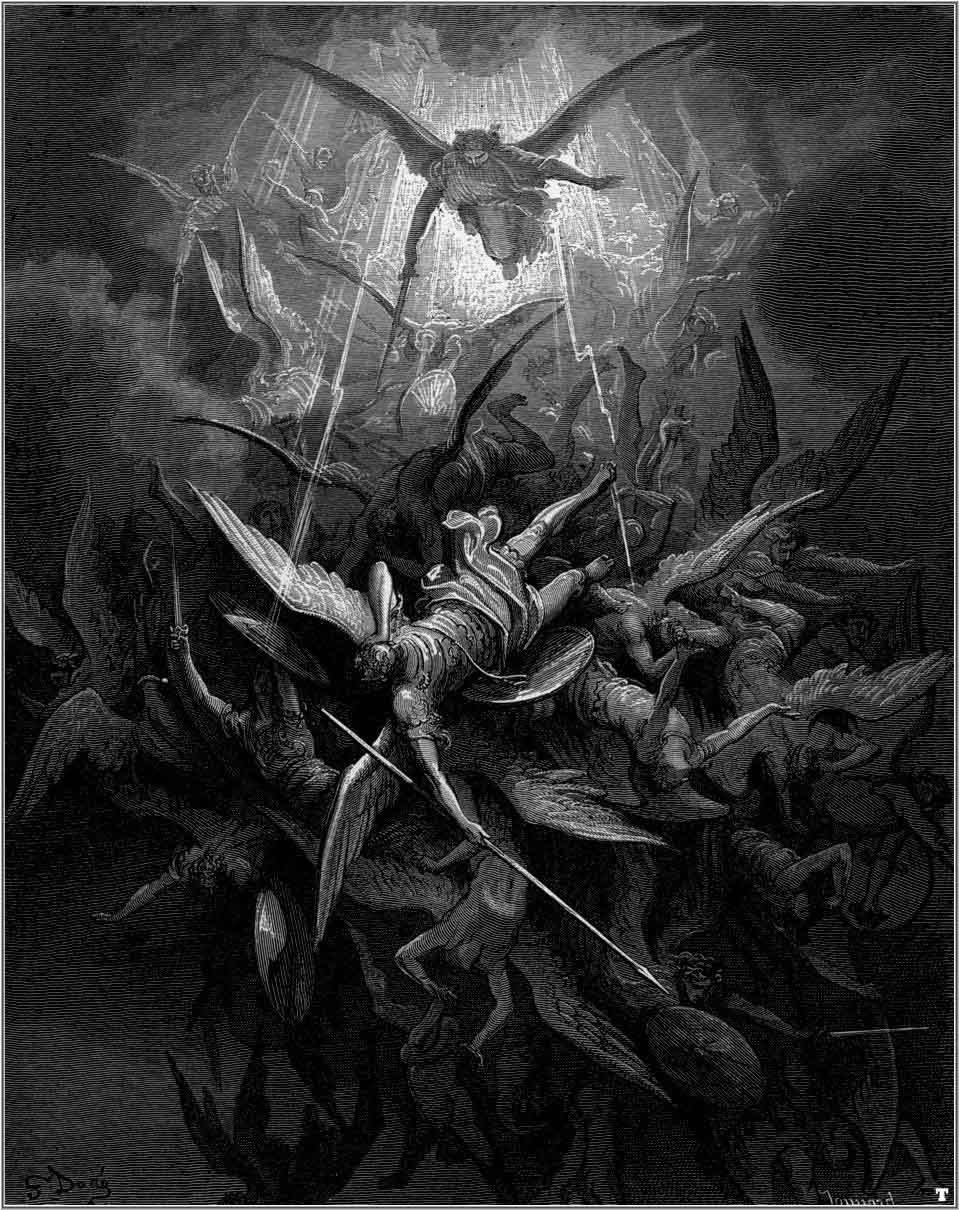
Just as Jacob was said to have fought against El and man, so too does Yahweh:
Furthermore, the information in this thread gives support to the Documentary Hypothesis [1], [2], [3], as does the hypothesis lend further credence to the thread.
In conclusion, I propose that "Israel" actually means:
"To fight against the God El."
"The followers of Yahweh persevere against El."
Now,... to understand why Jacob, the Hebrew-Israelites, or the Jews would fight against God, it gets a bit more complicated. Please bear with me
As many of us know, the proper name for the national God of Israel is Yahweh (YHWH). Each time we read "LORD" fully capitalized in the English translation of the Old Testament, it represents the name "YHWH".

(Yahu)
As many of us have controversially concluded; YHWH is not the only God of the Old Testament. In accord with the local Canaanite religions, the God El is known as the Father of the Gods, with YHWH being one of His Sons.

(El)

The following Biblical passages, amongst others, clearly depict El as the Father God, with Yahweh as His Son.
When the Most High ('Elyon) allotted people for inheritance, when He divided up the sons of man, He fixed the boundaries for people according to the number of the Sons of El. But Yahweh’s portion is His people, Jacob (Israel) is His own inheritance.
(Deuteronomy 32:8-9)
(Wording found in the oldest manuscripts)
"Ascribe to Yahweh, O Sons of EL, ascribe to Yahweh glory and strength."
(Psalm 29:1)
(Retranslated to better reflect the original Hebrew)
"For who in the skies can be compared to Yahweh, who among the Sons of EL is like Yahweh?"
(Psalm 89:6)
(Retranslated to better reflect the original Hebrew)
[Bold brackets are my emphasis]
The Gods (Elohim) stand in the congregation of El. In the midst of the Gods (Elohim) He [El] judges.
“How long will you defend the unjust
and show partiality to the wicked? Defend the weak and the fatherless; uphold the cause of the poor and the oppressed? Rescue the weak and the needy; deliver them from the hand of the wicked? They [mankind] know nothing, neither will they understand. They walk in darkness. All the foundations of the Earth are shaken." [The Elohim addressed El]
"I have told you Gods (Elohim) that you are all Sons of Elyon. But you will die like mere mortals; you will fall like every other ruler.” [Replied El to the Elohim]
Rise up, O God (Elohim) [El], judge the earth, for all the nations are your inheritance.
(Psalm 82:1-8)
(Retranslated to better reflect the original Hebrew)
Once again referring to Genesis 32:28, let us examine with whom Jacob fought:
“Your name will no longer be Jacob, but Israel, because you have struggled against Elohim and against humans and have overcome.”
When the word "Elohim" is used in a singular context, it is referring to El. When the word "Elohim" is used in a plural context, it is referring to either the Divine Council or to the Sons of El.
In the instance of Jacob's fight, Elohim is used in a singular context; referring to El. Additionally, the end portion of the event gives us even further context into the identity of Jacob's adversary:
So Jacob called the place Peniel, saying, “It is because I saw Elohim face to face, and yet my life was spared.”
(Genesis 32:30)
In addition to a geographic location, the word "Peniel" is actually a Hebrew compound word stemming from "Panim/Paneh/Panah El", which means; "Face of El".
Although El is the Father of the Gods, we are repeatedly told, in the Old Testament, that Yahweh (YHWH) is the God of Israel. It is my conclusion that the religion presented in the Old Testament theologically illustrates either a falling away from Elohism/Elism in favor of Yahwism/Jahism,... or the conquering, stamping-out, and assimilating the religion of El by the religion of Yahweh.

Just as Jacob was said to have fought against El and man, so too does Yahweh:
In that day the Yahweh will punish the powers in the heavens above and the kings on the earth below.
(Isaiah 24:21)
Furthermore, the information in this thread gives support to the Documentary Hypothesis [1], [2], [3], as does the hypothesis lend further credence to the thread.
In conclusion, I propose that "Israel" actually means:
"To fight against the God El."
"The followers of Yahweh persevere against El."
edit on 12/5/14 by Sahabi because: (no reason given)
a reply to: new_here
Hello new_here!
Is Ra El? No he is not! Ra is Ra and El is El
The entire Isis/Ra/El debate is a bit of a "show boat" that has been stated many times over. I feel that a deep examination of the linguistics and theology of the Old Testament does not support such an etymology.
Alternatively, there is much evidence of a parallel to the Canaanite religion by way of a monarchal/hierarchal pantheon. The Old Testament illustrates El and Yahweh as two separate deities, with an obviously messy attempt to syncretize the two into one.
The Hebrew-Israelites abandoned the worship of El for the worship of Yahweh (Israel = To Fight Against El).
Hello new_here!
Is Ra El? No he is not! Ra is Ra and El is El
The entire Isis/Ra/El debate is a bit of a "show boat" that has been stated many times over. I feel that a deep examination of the linguistics and theology of the Old Testament does not support such an etymology.
Alternatively, there is much evidence of a parallel to the Canaanite religion by way of a monarchal/hierarchal pantheon. The Old Testament illustrates El and Yahweh as two separate deities, with an obviously messy attempt to syncretize the two into one.
The Hebrew-Israelites abandoned the worship of El for the worship of Yahweh (Israel = To Fight Against El).
a reply to: Sahabi
Yeah, I didn't really think Ra was El, just thought it was interesting how 'Is Ra El?' turned up in the word 'Israel.'
Yes, this is interesting. Many years ago, I read "Isaac Assimov Looks at the Old Testament" and was intrigued by the evidence of translations merging different entities and leading us to believe they were simply various names of God.
If this is true, it seems a very strange choice to me. I always thought El was the head honcho, and a lot nicer than Yahweh. But what do I know. What do you make of this choice?
Yeah, I didn't really think Ra was El, just thought it was interesting how 'Is Ra El?' turned up in the word 'Israel.'
The Old Testament illustrates El and Yahweh as two separate deities, with an obviously messy attempt to syncretize the two into one.
Yes, this is interesting. Many years ago, I read "Isaac Assimov Looks at the Old Testament" and was intrigued by the evidence of translations merging different entities and leading us to believe they were simply various names of God.
The Hebrew-Israelites abandoned the worship of El for the worship of Yahweh (Israel = To Fight Against El).
If this is true, it seems a very strange choice to me. I always thought El was the head honcho, and a lot nicer than Yahweh. But what do I know. What do you make of this choice?
I think I accidently pushed the alert button, and I didnt mean to. so if mods get that, please disregard.
Interesting topic by the way OP, S&F.
Interesting topic by the way OP, S&F.
originally posted by: new_here
a reply to: Sahabi
If this is true, it seems a very strange choice to me. I always thought El was the head honcho, and a lot nicer than Yahweh. But what do I know. What do you make of this choice?
This is just more of the same bad information that floats around.
The El that Abraham, Isaac and Jacob knew was Yahweh. He simply had not ever given them His more personal name until Moses. Why? Because He was about to get very personal.
Another area of confusion for many is that theses patriarchs were often dealing with Yahweh's messenger or overseer Mike. A relationship that really never ended. He is also known as the Strong Hand, Angel of the Lord ect. Mike was given a wide range of responsibilities and duties throughout. The relationship between Yahweh and Mike is clearly demonstrated at the burning bush. Until then Yahweh had obscured Himself by working through His Arch angels, a relationship that never ended even after Yahweh talked with Moses.
That interestingly corresponds to the idea that disobedient Israel was exiled to Assyria, while devout Judah wasnt punished... curious...
The Hebrew origins according to this very good documentary are as a reactionary Canaanite group that rebels against the traditional City state culture
where men ruled as the descendants of the Gods and on their behalf, the struggle of Israel should be understood in those terms, conflict with the
Divine Rulers of Egypt and thus their Pantheon, likewise the Assyrians and Babylonians, thus against the basis of the Elohim extended Pantheon, it is
the position of the outsider.
The identification of their cause with that of Yahweh in his perceived conflict to become the singular Heavenly power thus sets them at variance not only with those Heavenly powers that they struggle against, but also the peoples that worship them, an ideology of independence and conflict, so the nature of Israel is to struggle against the Heavenly hosts, even the very suggestion of their having power.
The apparent conflict is largely a product of their own mindset from their very origins, both El and Yah can be dated back as Deities of the Northern Semitic Pantheon at Ebla during the third millenium, and there were natural mythological conflicts and tensions within that Pantheon, by so strongly identifying with Yah they simply become players within an archetypal mythological struggle against all other Gods and peoples, and thus somewhat unbalanced.
The identification of their cause with that of Yahweh in his perceived conflict to become the singular Heavenly power thus sets them at variance not only with those Heavenly powers that they struggle against, but also the peoples that worship them, an ideology of independence and conflict, so the nature of Israel is to struggle against the Heavenly hosts, even the very suggestion of their having power.
The apparent conflict is largely a product of their own mindset from their very origins, both El and Yah can be dated back as Deities of the Northern Semitic Pantheon at Ebla during the third millenium, and there were natural mythological conflicts and tensions within that Pantheon, by so strongly identifying with Yah they simply become players within an archetypal mythological struggle against all other Gods and peoples, and thus somewhat unbalanced.
a reply to: Logarock
By context it should be obvious I meant the exile under Tiglath Pilesar to Assyria, which conquered Israel, but couldnt take Judah. Its merely interesting to note in relation to this thread, that it was said they were being punished for their practices against god.
In any case the more likely truth is that the Assyrians couldnt take it due to internal problems like civil war, uprisings of vassal states, etc, and external problems such as extended supply lines.
Neo-Assyrian Empire
By context it should be obvious I meant the exile under Tiglath Pilesar to Assyria, which conquered Israel, but couldnt take Judah. Its merely interesting to note in relation to this thread, that it was said they were being punished for their practices against god.
In any case the more likely truth is that the Assyrians couldnt take it due to internal problems like civil war, uprisings of vassal states, etc, and external problems such as extended supply lines.
Neo-Assyrian Empire
actually the different gods starts way back in genesis.
elohim creates adam, male and female in "his" image. i think its more likely to mean, a creator elohim in the singular voice, created copies of the other elohim, male and female, and named them after himself (adam/atum) but because this info derived from 2 different sources (pharaoh's scholars and moses' mesopotamian mother) he used the mesopotamian word for it,which i believe was alulim (first name on the kings list of sumer). in effect, alulim is elohim and also atum/adam (in effect, the word alulim went from ham to egypt, down to moses in the form of atum. moses chose atum/adam for the name of the created and alulim/elohim for the name of the creator.
but we ain't done yet! when the creator elohim creates the copies of the elohim, he tells them to go forth, be fruitful and multiply. multiply means to procreate, to have sex, to have KNOWLEDGE of each other. then skip ahead and suddenly this same creator is mad that people are having knowledge of each other? hello? yeah, 2 different gods. the guy who got mad that we were procreating was not the guy who created us.
elohim creates adam, male and female in "his" image. i think its more likely to mean, a creator elohim in the singular voice, created copies of the other elohim, male and female, and named them after himself (adam/atum) but because this info derived from 2 different sources (pharaoh's scholars and moses' mesopotamian mother) he used the mesopotamian word for it,which i believe was alulim (first name on the kings list of sumer). in effect, alulim is elohim and also atum/adam (in effect, the word alulim went from ham to egypt, down to moses in the form of atum. moses chose atum/adam for the name of the created and alulim/elohim for the name of the creator.
but we ain't done yet! when the creator elohim creates the copies of the elohim, he tells them to go forth, be fruitful and multiply. multiply means to procreate, to have sex, to have KNOWLEDGE of each other. then skip ahead and suddenly this same creator is mad that people are having knowledge of each other? hello? yeah, 2 different gods. the guy who got mad that we were procreating was not the guy who created us.
a reply to: Sahabi
The first syllable in ישראל or "Israel" is made of three letters, ישר or JSR in Latin lettering. Depending on the vocalisation used it means 'straight' or 'upright' or 'smooth' or figuratively like in English to mean 'honest' or 'true' &c (Strong's H3474 and the next few entries). So Israel could be read to mean that Jacob 'corrected'-- or 'owned El' to use a modern expression.
By the way, מלאך האלהים or "Malak ha-Elohim" which means 'The Angel of God' is often to be understood as the angel most Christians call Satan or the devil. As in the story where Jacob fights the Angel of God, where the angel acts as Jacob's 'adversary', or "satan".
As the story goes, Jacob beat the devil. Try telling that to a Christian and his head explodes for how can this be right, to them God and Satan are like Itchy and Scratchy or Black and White? Truth is however, that Satan is 'The Right Hand of God', or as St. Stephen says it as his eyes gaze upon the area around the apex of the Northern sky: I see heaven opened, and the Son of Man (Ursa Major) standing by 'God's Right Hand' (Draco). Unlike Draco and Ursa Major, 'the Father' or 'El' is not chained. To see his shape, which is that of 'a king seated on a throne', remove the chains of Draco and de-focus for a while.
The first syllable in ישראל or "Israel" is made of three letters, ישר or JSR in Latin lettering. Depending on the vocalisation used it means 'straight' or 'upright' or 'smooth' or figuratively like in English to mean 'honest' or 'true' &c (Strong's H3474 and the next few entries). So Israel could be read to mean that Jacob 'corrected'-- or 'owned El' to use a modern expression.
By the way, מלאך האלהים or "Malak ha-Elohim" which means 'The Angel of God' is often to be understood as the angel most Christians call Satan or the devil. As in the story where Jacob fights the Angel of God, where the angel acts as Jacob's 'adversary', or "satan".
As the story goes, Jacob beat the devil. Try telling that to a Christian and his head explodes for how can this be right, to them God and Satan are like Itchy and Scratchy or Black and White? Truth is however, that Satan is 'The Right Hand of God', or as St. Stephen says it as his eyes gaze upon the area around the apex of the Northern sky: I see heaven opened, and the Son of Man (Ursa Major) standing by 'God's Right Hand' (Draco). Unlike Draco and Ursa Major, 'the Father' or 'El' is not chained. To see his shape, which is that of 'a king seated on a throne', remove the chains of Draco and de-focus for a while.
originally posted by: Utnapisjtim
a reply to: Sahabi
As the story goes, Jacob beat the devil. Try telling that to a Christian and his head explodes for how can this be right, to them God and Satan are like Itchy and Scratchy or Black and White? Truth is however, that Satan is 'The Right Hand of God', or as St. Stephen says it as his eyes gaze upon the area around the apex of the Northern sky: I see heaven opened, and the Son of Man (Ursa Major) standing by 'God's Right Hand' (Draco). Unlike Draco and Ursa Major, 'the Father' or 'El' is not chained. To see his shape, which is that of 'a king seated on a throne', remove the chains of Draco and de-focus for a while.
Or burst out laughing like I am doing at this whole post.
originally posted by: Kantzveldt
The apparent conflict is largely a product of their own mindset from their very origins, both El and Yah can be dated back as Deities of the Northern Semitic Pantheon at Ebla during the third millenium, and there were natural mythological conflicts and tensions within that Pantheon, by so strongly identifying with Yah they simply become players within an archetypal mythological struggle against all other Gods and peoples, and thus somewhat unbalanced.
Well why did Pharaoh say he had never heard of Yahweh? Not even Joseph used the name. The Egyptians nor the Hebrews had ever heard the name until Moses.
As far as unbalanced, its not like the Babylonians, Egyptians and the Syrians, to name a few, didn't constantly war with each other under the flag of one elevated member of the pantheon or another.
new topics
-
African "Newcomers" Tell NYC They Don't Like the Free Food or Shelter They've Been Given
Social Issues and Civil Unrest: 44 minutes ago -
Russia Flooding
Other Current Events: 2 hours ago -
MULTIPLE SKYMASTER MESSAGES GOING OUT
World War Three: 2 hours ago -
Two Serious Crimes Committed by President JOE BIDEN that are Easy to Impeach Him For.
US Political Madness: 3 hours ago -
911 emergency lines are DOWN across multiple states
Breaking Alternative News: 3 hours ago -
Former NYT Reporter Attacks Scientists For Misleading Him Over COVID Lab-Leak Theory
Education and Media: 5 hours ago -
Why did Phizer team with nanobot maker
Medical Issues & Conspiracies: 6 hours ago -
Pro Hamas protesters at Columbia claim hit with chemical spray
World War Three: 6 hours ago -
Elites disapearing
Political Conspiracies: 8 hours ago -
A Personal Cigar UFO/UAP Video footage I have held onto and will release it here and now.
Aliens and UFOs: 8 hours ago
top topics
-
British TV Presenter Refuses To Use Guest's Preferred Pronouns
Education and Media: 16 hours ago, 17 flags -
Go Woke, Go Broke--Forbes Confirms Disney Has Lost Money On Star Wars
Movies: 10 hours ago, 13 flags -
Pro Hamas protesters at Columbia claim hit with chemical spray
World War Three: 6 hours ago, 11 flags -
Freddie Mercury
Paranormal Studies: 10 hours ago, 7 flags -
Elites disapearing
Political Conspiracies: 8 hours ago, 7 flags -
Nirvana - Immigrant Song
Music: 15 hours ago, 5 flags -
A Personal Cigar UFO/UAP Video footage I have held onto and will release it here and now.
Aliens and UFOs: 8 hours ago, 5 flags -
Why did Phizer team with nanobot maker
Medical Issues & Conspiracies: 6 hours ago, 4 flags -
Former NYT Reporter Attacks Scientists For Misleading Him Over COVID Lab-Leak Theory
Education and Media: 5 hours ago, 3 flags -
911 emergency lines are DOWN across multiple states
Breaking Alternative News: 3 hours ago, 3 flags
active topics
-
-@TH3WH17ERABB17- -Q- ---TIME TO SHOW THE WORLD--- -Part- --44--
Dissecting Disinformation • 518 • : Guyfriday -
British TV Presenter Refuses To Use Guest's Preferred Pronouns
Education and Media • 50 • : sine.nomine -
African "Newcomers" Tell NYC They Don't Like the Free Food or Shelter They've Been Given
Social Issues and Civil Unrest • 2 • : ToneD -
Running Through Idiot Protestors Who Block The Road
Rant • 106 • : Terpene -
MULTIPLE SKYMASTER MESSAGES GOING OUT
World War Three • 12 • : Zaphod58 -
Elites disapearing
Political Conspiracies • 18 • : GENERAL EYES -
Echo & The Bunnymen - The Killing Moon!
Music • 11 • : Freeborn -
Mood Music Part VI
Music • 3049 • : boozo -
Are the 'Abrahamic Religions' all Really the Worshipping the Same Abrahamic God?
Conspiracies in Religions • 191 • : ToneD -
Go Woke, Go Broke--Forbes Confirms Disney Has Lost Money On Star Wars
Movies • 16 • : GotterDameron23
